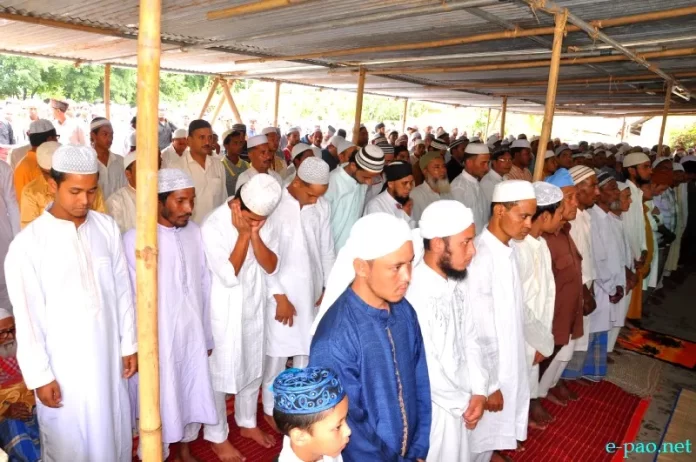By Mediha Shah
Nestled in the northeastern corner of India, Manipur is a state rich in cultures, traditions, and histories. Among the communities that have significantly contributed to its heritage, the Muslim community, known locally as Pangals, stands out for its crucial yet often underappreciated role.
The roots of the Pangal community in Manipur can be traced back to the early 17th century during the reign of King Khagemba. General Muhammad Shani from Taraf in Sylhet led a thousand Muslim soldiers to Manipur, marking the beginning of their presence in the region. King Khagemba recognized their skills and contributions, granting Muslim families titles based on their vocations, which later became the names of their lineage groups.
One of the most significant contributions of the Muslim community came during the Burmese invasion of 1819, a period known as “Chahi Taret Khuntakpa” or the Seven Years’ Devastation. The Burmese forces caused widespread destruction and suffering in Manipur. During this period, the Pangals played a crucial role in resisting the invaders. After the Burmese were expelled, the task of rebuilding fell upon the survivors, and the Muslim community rose to the occasion. Their skills in various crafts, agriculture, and trade were vital in reviving the economy. The Pangals helped reconstruct infrastructure, rebuild homes, and restore agricultural productivity, ensuring that Manipur could recover from the devastation and return to normalcy.
Beyond their efforts in times of crisis, the Muslim community has enriched Manipuri culture in myriad ways. The Pangals brought with them their own traditions, which blended with local customs to create a unique cultural synthesis. This is evident in the culinary landscape of Manipur, where Muslim influences can be seen in various dishes and cooking techniques. The community has also contributed to the rich tapestry of Manipuri music, dance, and literature. Notable figures from the Muslim community have made significant contributions to Manipuri literature, enriching the state’s cultural heritage with their writings and poetry.
In contemporary times, the Muslim community continues to play a vital role in Manipur’s socio-economic fabric. They are actively involved in various sectors, including education, healthcare, and entrepreneurship. Muslim organizations and individuals have been at the forefront of promoting inter-community harmony and development initiatives, ensuring that Manipur continues to thrive as a diverse and inclusive state.
A poignant tale of courage and compassion emerged on May 15, 2023, amidst Manipur’s ethnic tensions. An 18-year-old Kuki woman, brutally assaulted and abducted to Wangkhei, managed a daring escape and encountered Rahim (name changed), a Pangal Muslim auto driver. Rahim hid her among his sacks of produce, shielding her from her mugger. He safely transported her to the Bishnupur police station and continued to support her, exemplifying the human spirit’s resilience and the power of kindness in times of strife.
Pangal Muslim drivers have emerged as guardians of safe passage and beacons of hope amidst the ongoing conflict. Trusted by both Meiteis and Kukis, they facilitate safe passage through the turbulent region, showcasing their impartiality and commitment to peace.
On the night of May 3, 2023, Meitei Muslims in Imphal risked their own safety to rescue thousands of Christian Kukis from imminent danger. Simultaneously, in the periphery of Meitei-dominated central valleys, Muslims of Kwakta welcomed fleeing Meiteis escaping Kuki forces’ violence. Organizations like Jamaat-e-Islami Hind have also joined in distributing relief and advocating for peace. Despite the complexities of the conflict, the message remains clear: Muslims in Manipur are determined to protect the state’s integrity and work towards lasting peace.
The history of Manipur is incomplete without acknowledging the profound contributions of the Muslim community. From their crucial role in defending the state during the Burmese invasion to their ongoing efforts in fostering development and harmony, the Pangals have been an indispensable part of Manipur’s journey. Their story is a testament to the strength that comes from unity and the rich cultural heritage that emerges from diversity. As Manipur continues to evolve, the legacy of its Muslim community serves as a reminder of the importance of solidarity and mutual respect in building a resilient and vibrant society.




